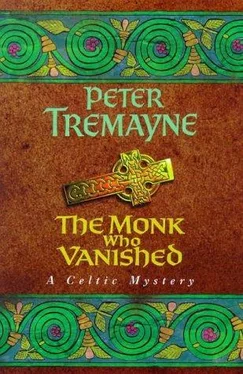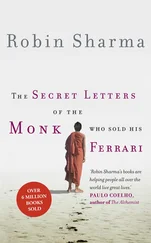Peter Tremayne - The Monk Who Vanished
Здесь есть возможность читать онлайн «Peter Tremayne - The Monk Who Vanished» весь текст электронной книги совершенно бесплатно (целиком полную версию без сокращений). В некоторых случаях можно слушать аудио, скачать через торрент в формате fb2 и присутствует краткое содержание. Жанр: Исторический детектив, на английском языке. Описание произведения, (предисловие) а так же отзывы посетителей доступны на портале библиотеки ЛибКат.
- Название:The Monk Who Vanished
- Автор:
- Жанр:
- Год:неизвестен
- ISBN:нет данных
- Рейтинг книги:3 / 5. Голосов: 1
-
Избранное:Добавить в избранное
- Отзывы:
-
Ваша оценка:
- 60
- 1
- 2
- 3
- 4
- 5
The Monk Who Vanished: краткое содержание, описание и аннотация
Предлагаем к чтению аннотацию, описание, краткое содержание или предисловие (зависит от того, что написал сам автор книги «The Monk Who Vanished»). Если вы не нашли необходимую информацию о книге — напишите в комментариях, мы постараемся отыскать её.
The Monk Who Vanished — читать онлайн бесплатно полную книгу (весь текст) целиком
Ниже представлен текст книги, разбитый по страницам. Система сохранения места последней прочитанной страницы, позволяет с удобством читать онлайн бесплатно книгу «The Monk Who Vanished», без необходимости каждый раз заново искать на чём Вы остановились. Поставьте закладку, и сможете в любой момент перейти на страницу, на которой закончили чтение.
Интервал:
Закладка:
The bó-aire was a local magistrate, a chieftain without land whose wealth had been initially judged by the number of cows he owned, hence he was called a ‘cow chief. Small communities, such as a township, were usually ruled by a bó-aire who owed his allegiance to a greater chieftain.
‘I am Fidelma of Cashel,’ Fidelma introduced herself. She was more formal with the man once she heard that he held rank. ‘What is your name?’
The smith straightened perceptibly. Who had not heard of the King’s sister? The chieftain to whom he owed allegiance was Fidelma’s own cousin, Finguine of Cnoc Aine.
‘I am called Nion, lady.’
Fidelma drew out the arrows from her marsupium. The one from the assassin’s quiver and the other, broken one she had taken from Mochta’s chamber.
‘Tell me what you make of these, Nion,’ she asked without explanation.
The smith wiped his hands on his apron and took the arrows from her hands and, holding them up, examined them carefully.
‘I am no fletcher, although I have made arrow heads before now. These are of competent workmanship. The head on this one is made of bronze and constructed, as you see, with a hollow cro …’
‘A what?’ demanded Eadulf, leaning forward.
‘A socket. See there where the wood of the shaft is inserted? These are especially fine for you see that the head is fixed by a tiny metal rivet.’
‘And where would you guess they were made?’ pressed Fidelma.
‘No need to guess,’ replied the smith with a smile. ‘See the flight? That bears the symbol of a fletcher of Cnoc Aine and you are in that territory, as you must know, lady.’
Fidelma smiled thinly. ‘And would you be able to point to such a craftsman, Nion?’
The smith gave an unexpected roar of laughter. ‘See my neighbour there …’ he said, pointing to a carpentry shop nearby. ‘He makes the shafts and constructs the flights, while I make the heads and fix them in place. This arrow is one of a batch I made not above a week ago. I recognise the metalworking. Why do you ask, lady?’ he added, returning the arrows to her.
His assistant returned and emptied a bag of charcoal on the furnace fire, poking it with an iron rod.
‘I would like to know something about the man to whom you sold these arrows.’
At once the smith’s eyes narrowed suspiciously. ‘Why?’
‘If you have nothing to hide, Nion, you will tell me. Remember that you are answering the questions of a dálaigh and I hold you to your position as magistrate of this town.’
Nion stared at her as if trying to gauge her intentions and then shrugged. ‘Then as bó-aire to dálaigh, I will answer. I do not know the man. I merely called him the Saigteóir because he looked and acted like a professional archer. He came to my forge more than a week ago and wanted me to produce two dozen arrows. He paid me well for the task. He collected them a few days later and that is all I know.’
Eadulf was disappointed but Fidelma did not give up.
‘Sometimes memories have to be teased out,’ she observed. ‘You say the man looked like a professional archer. Describe him.’
After some hesitation Nion the smith described the bowman whom Gionga had slain. It was a good description and there was no doubting the identification of the man.
‘You spoke to him. How did he sound?’
The smith rubbed his jaw and then his eyes brightened. ‘He spoke roughly, like any professional soldier but he was not of the warrior caste; not a man born into the nobility of the craft of arms.’
‘Did you not ask what he was doing here?’ intervened Eadulf.
‘No. Nor would I ask him. Better not to ask a warrior why he wants weapons unless he wants to volunteer such information.’
‘I can understand that,’ agreed Fidelma. ‘So he volunteered no information?’
The smith shook his head.
‘Did he have any companion with him?’
‘No.’
‘You seem certain of that. Did he ride a horse?’
‘Oh yes. He rode a chestnut mare. I noticed that for the beast’s rear shoes needed fixing. One had been struck loose by a stone. I sorted out that problem at once.’
‘Could you tell anything from the horse?’ Fidelma knew well enough that a professional smith should tell in what style a horse was shod, sometimes even to identifying the geographical location of the smith who did the work.
‘That it was last shoed in the north was obvious,’ the smith replied at once. ‘I have seen that style before and know it is used by the smiths of Clan Brasil. I could also tell that the animal had seen its best years. It was not the sort of animal that a warrior of status would ride, though it was a war horse.’
‘So what else did you discern?’
‘Nothing. What business was it of mine?’
‘You are the bó-aire ,’ Fidelma pointed out. ‘It is your responsibilityto be aware of what takes place in your territory. These arrows that you sold to this archer were used in an attempted assassination on my brother, the King, and the Prince of the Uí Fidgente. Have you not heard?’
Nion stared at her without speaking. It was obvious that the news shocked him.
‘I had no hand in this affair, lady,’ he said anxiously. ‘I merely made the arrows and sold them. I did not know who the man was …’
Fidelma raised her hand to quiet his outburst.
‘I tell you this only to show that sometimes these matters can be your business, magistrate of Imleach. Bearing this in mind, is there anything else that you should tell me about this archer?’
There was no doubt that Nion was trying his best to think now, and he raised one hand to the back of his head to rub it as an aid to the process.
‘I can add nothing further, lady. But, of course, if he were a stranger in the area, then this archer must have stayed a few days within this vicinity in order to wait for the arrows. Perhaps the inn where he stayed might have further knowledge?’
‘Where would that inn be?’
Nion gestured eloquently. ‘Assuming that he did not seek shelter in the abbey itself, there is only Cred’s inn down the street at the far end of the town. It has a reputation and is not licensed by me. That is the abbot’s wish, incidentally. He has tried to close it down on moral grounds. But it is the only inn within the town. I think this archer must have stayed there. If he did not, then there is no further help that I can offer.’
Fidelma thanked the smith and left him standing, hands on his hips, feet splayed apart, regarding her with a suspicious look as she walked away with Eadulf.
‘If the archer had had his horse shod by a smith in the territory of Clan Brasil,’ volunteered Eadulf reflectively, ‘then perhaps he knew Brother Mochta? Didn’t the abbot say he came from Clan Brasil?’
‘Well spotted, Eadulf. But though Mochta came from Clan Brasil and the archer’s horse was shod there, we have been told that the archer’s accent does not place him as a native from those northern lands.’
Fidelma was silent a minute as she considered the matter. ‘We still have to place Brother Mochta in a relationship with this archer, if, indeed, we can square this mystery of the tonsure.’
Eadulf groaned softly in despair. ‘These links are so obvious but they fall on that one mystery of the tonsure.’
They had been proceeding along the main street to the far end ofthe township. There was a complex of small buildings standing apart from the others. Fidelma paused.
‘This looks like Cred’s tavern.’ She gazed back down the street. ‘Well, it is sufficiently out of the way here for the archer to have stayed without the smith necessarily knowing if he came from here or not.’
Читать дальшеИнтервал:
Закладка:
Похожие книги на «The Monk Who Vanished»
Представляем Вашему вниманию похожие книги на «The Monk Who Vanished» списком для выбора. Мы отобрали схожую по названию и смыслу литературу в надежде предоставить читателям больше вариантов отыскать новые, интересные, ещё непрочитанные произведения.
Обсуждение, отзывы о книге «The Monk Who Vanished» и просто собственные мнения читателей. Оставьте ваши комментарии, напишите, что Вы думаете о произведении, его смысле или главных героях. Укажите что конкретно понравилось, а что нет, и почему Вы так считаете.












